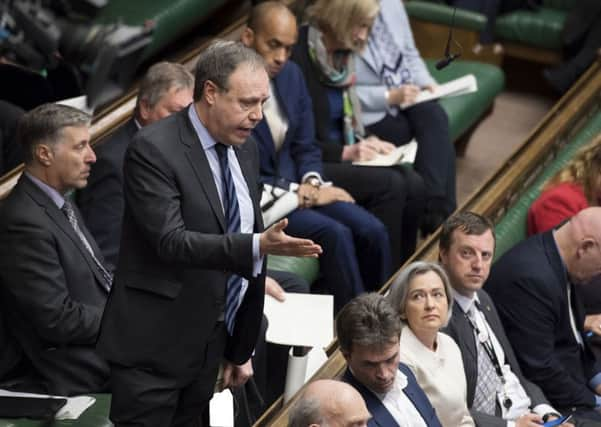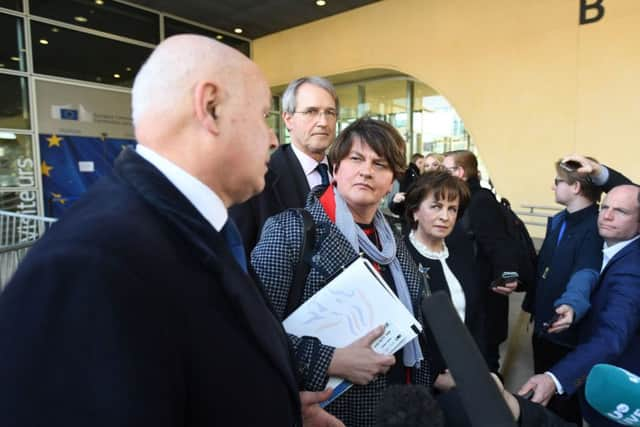Ben Lowry: The DUP’s best hope now is that a new, tougher Tory leader comes in


But the very same day, Downing Street announced that it was standing down emergency planning for ‘no deal’.
A spokesman for the government said that it would continue to prepare for every eventuality but even so the decision was telling — and was meant to be so.
Advertisement
Hide AdAdvertisement
Hide AdOnce again, the UK was sending a signal to the EU that it would do everything it could to avoid crashing out without an agreement.


The government was endorsing almost the opposite course of action to the one recommended by Mervyn King, former governor of the Bank of England, who advised it to seek a six month extension so that both sides, the UK and the EU, could prepare for an exit without an agreement — the risks of which, he said, had been greatly exaggerated.
The phrase that has been said of Theresa May, that she would in reality take a bad deal over no deal, in contrast to her pledge that she would prefer no deal to a bad deal, gets ever more pertinent.
This is the exact time to step up preparations for ‘no deal,’ while working to see if an agreement can be passed by MPs, but she won’t.
Advertisement
Hide AdAdvertisement
Hide AdDUP relations with Mrs May reached an all-time low this week.
Nigel Dodds, Arlene Foster and Sammy Wilson all issued scathing criticisms of the prime minister.
This is a high-wire strategy.
Presumably it is intended to enhance the sense among backbench Conservative MPs that the DUP’s problem is with its current leader, not with it as a party, or with the Confidence and Supply agreement between the DUP and Tories.
But given that Mrs May is theoretically safe in her tenure in Downing Street if her Withdrawal Agreement does not pass (she only said she would step aside if it did), because she cannot be challenged again as Conservative leader until the end of the year, the danger is that such attacks entrench her in her determination to push through the backstop, perhaps with Jeremy Corbyn, in part to spite the DUP.
Advertisement
Hide AdAdvertisement
Hide AdIf the DUP aim is to help create a mood in which a change of Tory leader becomes inevitable, perhaps due to overwhelming opposition among Tory MPs leading to her concluding she has to go, then it is a logical one.
The most likely way out of the backstop now is such a change in leader, who will countenance no deal (the other way is a return to the European Union).
Such a change of leader is not a forlorn hope: the Cabinet is said to have split 14 to 10 recently in favour of no deal, as opposed to other likely options such as a long extension. Mrs May was in the minority.
Another route to such a new Conservative leader is MEP elections that swing massively to pro Brexit candidates, and precipitate some form of Tory parliamentary coup at Westminster, perhaps also a general election that leads to a more eurosceptic Commons too.
Advertisement
Hide AdAdvertisement
Hide AdBut the risk then for the DUP is that a more pro Brexit leader would push ahead with softer post EU arrangements for Northern Ireland than for Great Britain.
The notion of different treatment for the Province, resulting in some sort of border in the Irish Sea, is now so entrenched in the thinking of the Westminster establishment that it might well be implemented in the event of no deal, let alone in less drastic scenarios.
In other words, Irish hardball tactics have worked a treat.
I was in Dublin recently and someone who moves in political circles there told me: relations are still excellent behind the scenes between London and Dublin.
I winced at, but was not remotely surprised by, the thought that there has been no pushback from the UK in the last two years.
Advertisement
Hide AdAdvertisement
Hide AdIt tells you everything you need to know about British weakness, and the risk of something constitutionally disastrous being imposed on NI in event of ‘no deal,’ due to a determination to placate guaranteed Irish fury in that situation — unless, as said, a stronger leader emerges. Might it be Sajid Javid?
He has bucked the trend of Tory-led UK weakness on a few issues.
Emma Little Pengelly’s tweet this week, reproduced above this article [in the print edition], was a rare example of explicit unionist criticism of Dublin.
In the recent past unionist representatives have seemed all too keen to troop into Stormont talks with Irish officials, who push in a way that the NIO seems rarely to do in reverse.
• Ben Lowry (@BenLowry2) is News Letter deputy editor
• Ben Lowry: The appalling sacking of Sir Roger Scruton